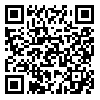1. Torres AR, Cruz BL, Vicentini HC, Lima MCP, Ramos-Cerqueira ATA. Obsessive-compulsive symptoms in medical students: prevalence, severity, and correlates. Acad Psychiatry. 2016;40(1):46–54. [
DOI]
2. Jaisoorya T, Janardhan Reddy Y, Nair Bs, Rani A, Menon P, Revamma M, et al. Prevalence and correlates of obsessive-compulsive disorder and subthreshold obsessive-compulsive disorder among college students in Kerala, India. Indian J Psychiatry. 2017;59(1):56. [
DOI]
3. American Psychiatric Association. Structured clinical interview for DSM-5 (SCID-5). Washington, DC: American Psychiatric Association; 2015.
4. Melli G, Chiorri C, Carraresi C, Stopani E, Bulli F. The role of disgust propensity and trait guilt in OCD symptoms: a multiple regression model in a clinical sample. J Obsessive Compuls Relat Disord. 2015;5:43–8. [
DOI]
5. Sangani A, Khoshvaght N, Azizi L, Abolghasemzadeh M. Modeling obsession with guilty feelings with mediating role of self-compassion nurses. Journal of Psychiatric Nursing. 2019;7(3):70–7. [Persian]
6. Alipour F, Saidpour S, Hasani J. The comparison of sensation seeking in sex addicts, stimulant addicts, opioid addicts and normal individual. J Mazandaran Univ Med Sci. 2015;25(125):135–8. [Persian] [
Article]
7. Ganji M. Psychopathology based on DSM-5. Tehran: Savalan; 2016. [Persian]
8. Hopwood CJ. Personality traits in the DSM–5. J Pers Assess. 2011;93(4):398–405. [
DOI]
9. Skodol AE, Morey LC, Bender DS, Oldham JM. The alternative DSM-5 model for personality disorders: a clinical application. Am J Psychiatry. 2015;172(7):606–13. [
DOI]
10. Parker G, Hadzi‐Pavlovic D, Both L, Kumar S, Wilhelm K, Olley A. Measuring disordered personality functioning: to love and to work reprised. Acta Psychiatr Scand. 2004;110(3):230–9. [
DOI]
11. Neziroglu F, McKay D. Introduction to the special issue: complexities and new developments in adolescent obsessive-compulsive related disorders. Clinical Case Studies. 2018;17(4):191–4. [
DOI]
12. Hepple J. Cognitive‐analytic therapy in a group: reflections on a dialogic approach. Br J Psychother. 2012;28(4):474–95. [
DOI]
13. Boschen MJ, Drummond LM. Community treatment of severe, refractory obsessive-compulsive disorder. Behav Res Ther. 2012;50(3):203–9. [
DOI]
14. Ryle A, Kerr IB. Introducing cognitive analytic therapy: principles and practice. John Wiley & Sons; 2002.
15. Yousefi A, Rahimian Boger I, Rezaei AM. The effectiveness of cognitive analytic therapy on mental health of patients with obsessive-compulsive disorder. Journal of Clinical Psychology. 2013;5(3):1–10. [Persian] [
Article]
16. Delavar A. Educational and psychological research. Tehran: Virayesh Pub; 2015. [Persian]
17. Kugler K, Jones WH. On conceptualizing and assessing guilt. J Pers Soc Psychol. 1992;62(2):318–27. [
DOI]
18. Janbozorgi M, Nouhi S, Naserifadafan M, Heydarizad M, Janbozorgi A. Construction, standardization and standardization of personality questionnaire based on DSM-5. Journal of Clinical Health Psychology. 2022;1(1):29–41. [Persian]
19. Aftab R, Bermas H, Abolmaali Alhoseini K. Structural prediction model of suicidal ideation based on the big five personality traits with the mediation of guilt. Middle Eastern Journal of Disability Studies. 2021;11:106. [Persian] [
Article]
20. Janbozorgi M, Rajezi Esfahani S. Multi-dimensional group therapy for obsessive-compulsive disorder. Iranian Journal of Psychiatry & Clinical Psychology. 2012;17(4):289–96. [Persian] [
Article]
21. Nazemi MJ, Tabatabaei SS, Moeeni F, Goodarzi N, Tatari E. Effectiveness of cognitive analytic therapy on reducing guilt fleeing and doubt in people with obsessive-compulsive disorder. Paramedical Sciences and Military Health. 2020;15(2):10–8. [Persian] [
Article]
22. Bateman AW, Ryle A, Fonagy P, Kerr IB. Psychotherapy for borderline personality disorder: mentalization based therapy and cognitive analytic therapy compared. Int Rev Psychiatry. 2007;19(1):51–62. [
DOI]
23. Ames DR. Assertiveness expectancies: How hard people push depends on the consequences they predict. J Pers Soc Psychol. 2008;95(6):1541–57. [
DOI]
24. Zargar Y, Mardani M, Mehrabizadeh Honarmand M. Effect of cognitive-behavioral intervention on perfectionism and guilt feeling of university students. Applied Psychology. 2011;6(4):71–85. [Persian] [
Article]
25. McCutcheon LK, Kerr IB, Chanen AM. Cognitive analytic therapy: a relational approach to young people with severe personality disorder. In: Kramer U; editor. Case formulation for personality disorders. Elsevier; 2019. [
DOI]
26. Ganbari Hashem Abadi B, Chagosaz M, Ghaseminiaii F, Akbari Klor SM, Mosavi SJ, Jadidi S. The effectiveness of cognitive-analytical group therapy on experiential avoidance and rumination in students with major depressive disorder. Journal of Psychological Studies. 2019;15(3):89–104. [Persian] [
Article]





